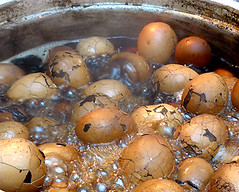
Tea Eggs cooking
Originally uploaded by Leone Fabre.
The International Food festival is on in Singapore for the next few weeks and we get to enjoy most of it......I say "most of it" 'cos there are just some things I can't bring myself to eat!
Fresh Frogs being the main one. :-(
But the other day whilst walking thru West Mall here at Bukit Batok, I see these "Tea Eggs" bubbling away, so bought three to try. Well I can't say I would rave about them, but they aer unusual to say the least.
It probably depends on what is in the water when you cook them...I could come up with other flavours that might include chili etc and then the eggs would be pretty good chopped up in a salad. But to eat these as they come out of the pot is not that 'tasty', if anything they are rather dry......but in a salad with other flavorings and a touch of mayo, just might (might!) make the difference.
Tea egg (Traditional Chinese: 茶葉蛋; Pinyin: chá yè dàn; literally "tea leaf egg") is a typical Chinese savory snack commonly sold by street vendors or in night markets in most Chinese communities throughout the world.
In Taiwan, tea eggs are a fixture of convenience stores. Through 7-Eleven chains alone, an average of 40 million tea eggs are sold per year. The price of tea eggs in convenience stores also serve as an important price index. In north-east China and Hong Kong, tea eggs are often privately made and sold; one might also see street vendors cooking and selling steaming-hot tea eggs. In Shanghai, tea eggs are sold by both convenience stores and private street vendors, where the tea eggs are often cooked together with dried tofu.
Tea eggs are simply hard-boiled egg that have been further stewed in a salted tea liquid. Other flavourings such as soy sauce and Chinese five-spice powder are often added as well. The egg is actually boiled twice. After the first boiling, when the insides are harder, the shell of each egg is lightly cracked without peeling. The eggs are then further boiled, which both lets the flavour of the tea into the egg and colours the surface egg white with a blurry cracked pattern that is somewhat reminiscent of marble. This process takes anywhere between one and three hours.
The tea used in making tea eggs are usually low in quality but high in dark-brown tannins. Green tea is considered too bitter for the use of making tea eggs. Most commonly in Hong Kong Pu-erh tea is used, but it can be substituted with black tea.
Typical ingredients for the stewing liquid include:
Oolong tea leaves
Minced black tea leaves
Star anise
Sichuan peppers
Soy sauce
Salt
Sugar

2 comments:
wow!? what an interseting post! great photo
I don't much like them either - I would rather look at them, like an Easter egg ;-) It is all in your taste buds I guess.
Post a Comment